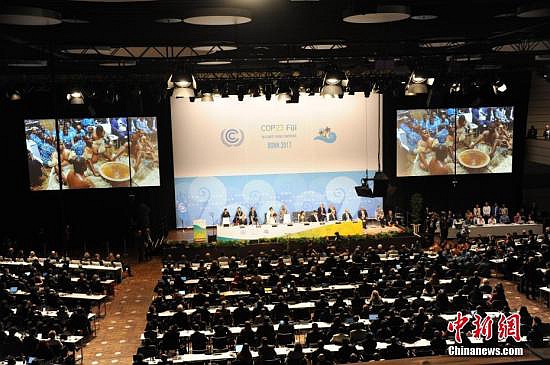The Planet remains under grave threat
- By Earl Bousquet
 0 Comment(s)
0 Comment(s) Print
Print E-mail China.org.cn, December 1, 2017
E-mail China.org.cn, December 1, 2017

The 23rd Conference of the Parties of the UN Framework Convention on Climate Change (UNFCCC) [Chinanews.com]
Scientists and researchers concerned about the future of Planet Earth and Humankind continue to highlight the consequences of the growing Carbon Dioxide level today – and its implications for tomorrow.
The 23rd Conference of the Parties of the UN Framework Convention on Climate Change (UNFCCC) (held on November 6-17 in Germany) warned that rising global temperatures and consequential extreme weather events do impact production, distribution and potential for spoilage of food the world over.
Worst to be hit and hurt will be billions of people in tropical countries in Africa, Asia and the Americas – including the Caribbean.
Another effect of rising and increased CO2 concentrations is on plant growth, with resulting implications for food production, distribution and consumption.
Under elevated concentrations of CO2, scientists say, protein content can decrease starkly in the following staple foods consumed mainly by the world's poor: rice, wheat, barley and potatoes.
Under such conditions, a recent study by a Harvard research team found that an additional 148 million people worldwide are at risk of protein deficiency in the years ahead, in addition to a billion-plus mothers and 354 million children.
All this is well known to governments worldwide. However not much is being done to address the issues and far less to reverse the worsening trend regarding carbon emissions.
In the U.S., the Trump administration has not only (basically) pulled out of the Paris Climate Change Accord, but is also doing all it can to reverse whatever advances were made under the Obama administration to put the world’s richest nation on the right environmental track.
The prime objective in Washington today is a return to opening the floodgates for "Dirty Coal" and fossil fuels to re-emerge as major drivers of energy and industrial production.
President Trump appointed a Climate Change denier to head the Environmental Protection Agency (EPA) – and fellow deniers have since waged war on science, pointedly defying established facts that have stood the test of time.
Developed nations are increasingly allowing their environmental policies to be both influenced and dictated by the chieftains of industry.
Just as bad are the non-governmental organizations and state actors in developed nations that aim their guns on softer and smaller targets (like developing countries) on issues ranging from animal protection to human rights.
Indigenous people continue to fight to defend the forests. However, while the 2015 Paris Accord recognized "the contribution of indigenous knowledge" in addressing Climate Change effects, it failed to recognize their land rights.
Ever since Columbus opened the way for Europe to steal their lands hundreds of years ago, indigenous people in Latin America have been demanding recognition of "crimes against the environment," decriminalization of activities to protect forests, direct negotiations over forest protection and prior consent before intrusive and extractive development by outsiders.
But those most able to help save Mother Earth continue to look the other way, ignoring the representatives of indigenous populations in the most affected countries, who can show the rest of the world how to cohabit with nature.
Hundreds of billions of dollars continue to be invested in extracting minerals, but not a cent into activities indigenous people can undertake to protect the world's forests.
For example, an expansive and expensive gold and titanium mine is being planned for French Guiana – a large French colony on the South American continent where the majority native population remains dirt-poor while the European Space Agency (ESA) earns billions blasting rockets into space.
The planned mine will see an open cast pit blasted out of forested land between two indigenous reserves, polluting the rivers and requiring the construction of a huge hydroelectric dam. But Paris has so far ignored the complaints of the affected indigenous people, some of who were also in Bonn.
COP 23 ended without any significant headway on combating carbon emissions or encouraging changing attitudes. But developing nations started laying the basis for more urgent future collective action.
For example, Beijing called on all sides at the COP 23 to adhere to the principles of equity, "common but differentiated responsibilities" and respective capabilities, taking actual conditions of each country into account while pushing forward negotiations on the implementation of the Paris Agreement.
Developing countries demonstrated unprecedented solidarity at the COP 23 and (some) developed countries also displayed flexibility, leading to the designating of a "pre-2020" agenda item for follow-up negotiations.
Developing nations, most affected by these problems, now have more shared responsibility for their related actions and consequences, especially in the absence of the U.S., stepping up to the plate in ways that can make a global difference.
More countries pledged in Bonn to join the global Climate Change battle. Syria and Nicaragua have agreed to join the Paris Accord, while Belgium, Finland, Germany, Slovakia, Spain and Sweden signed-up to the Doha Amendment, raising the number of ratifying countries to 90. The most elusive agreement, however, continues to be funding.
COP 23 urged greater efforts to deliver the agreed 100 billion U.S. dollars per year – by 2020 – that has long been pledged to support developing countries.
The struggle to Save the Planet will continue to score more victories than losses over time, as more people and governments come to realize that the very future of Mother Earth – and all of Humankind – is at stake.
Earl Bousquet is a contributor to china.org.cn, editor-at-large of The Diplomatic Courier and author of an online regional newspaper column entitled Chronicles of a Chronic Caribbean Chronicler.
Opinion articles reflect the views of their authors, not necessarily those of China.org.cn.





